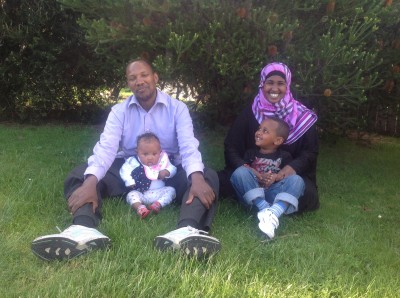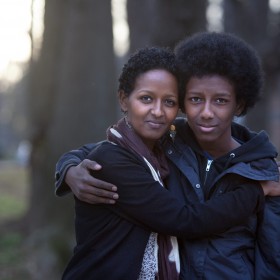Dahir Ali
Formerly known as Mr Dahir Hussein Maalim, now living in Hobart Australia.
I grew up in a small village in Ethiopia, called Madawalabu. My family were farmers, growing crops such as maize, wheat, and sorghum and keeping animals for meat and milk. We also had camels for transport, as well as for food purposes. Last year I saw camels for the first time in my home state of Tasmania, Australia and found it hard to drag myself away from this happy reminder of home.
As is the custom in some parts of Africa, my father had two wives who lived in separate houses in nearby villages. I consider both women and all the children to be my family. In total there were 12 children.
My troubles began when one of my brothers was in opposition to the government and was forced to hide in the bush. One day when my brother’s wife and I tried to see my brother, we were arrested. I was held prisoner for about 2 months and was tortured and beaten severely during this time. I was eventually released on condition that I did not contact or help the rebels or my brother.
When I was about 21, civil war broke out and I was forced to escape a violent attack near my village.. I literally ran for my life, taking nothing but the clothes on my back. My brother was killed and the rest of my family all ran in different directions and it was many years until I heard of many of them. I survived by living in the bush and eventually made my way to my uncle’s place. I was in a terrible state emotionally and physically. My uncle didn’t want to put his family at risk by harbouring me, however he tried to help by giving me food and money and by assisting me to get to a nearby city and then by truck to the Ethiopian and Kenyan border.
The Kenyan police were helpful and listened to my story and connected me with the UNHCR. It was 1992 when I moved to the rapidly growing Walda Refugee Camp, in Kenya and was provided with a tent and food for a few months. Although. I was very grateful for the help of the UNHCR, Walda Camp was still very dangerous, there was typhoid, malaria, malnutrition and hepatitis and bandits killed many refugees.
My ethnic group were a real target and in 1993 I was transferred to Kakuma Refugee Camp, for my own safety. The trip to Kakuma took about 3 days on a truck. Tents, some dry food and schooling were provided but the camp was hot, dusty and dangerous. I remember there were many scorpions and sometimes bandits shot at people from outside the camp. You never knew if you would live until the morning. I was hyper vigilant and very nervous all the time in the camp. I couldn’t sleep very well there. We were not supposed to leave the camp but we sneaked out at night sometimes anyway, to get some work and to experience the world outside.
It was about 2006 before I could apply to be recognised as a genuine refugee. I was alone during most of that time but around that time, I met my wife. I was told by the Australian High Commission that I would be repatriated. It was the happiest day I had experienced since I had been born. But I was still worried that they might not take me and that I might miss out or that I might die before I could leave. While I was waiting to leave, my wife became pregnant with our first child. I was heartbroken to leave without her but we thought it was our best chance, as I could apply to bring her when I arrived. Imagine how I felt that my baby was born and I had never seen him.
So my feelings were mixed, relief to go to a safe country but despair at leaving my homeland and family behind. At that time I still had no news of my parents or brothers and sisters.
The trip to Australia was very nerve wracking as it was only my second time on a plane. It was a very long journey, Nairobi, Hong Kong, Bangkok, Sydney, and Hobart. It was very, very cold when I arrived in Hobart.
I shared a house with another man I knew from the camp. The first time I went into town I didn’t know where anything was. I couldn’t find a meeting place where I could have coffee with other men and I went home without going into the shops, as they all appeared to be closed. I didn’t know about automatic doors! Simple things, like how to use the money were very hard for me. I also found it hard to believe I was in Australia. I spent all my money too quickly, by calling my wife in Kenya. I always wanted to hear my baby, even if he was crying. I was very lonely. I was unsure about everything and afraid of the police and that there would be fighting somewhere and that I wouldn’t be safe.
Things started to improve once I began my English classes, as it helped me to understand the culture and community as well as the language. I also made some friends and I received some excellent trauma counselling which has made the memories from my past less distressing.
As part of my English language course funded by the Australian Government, I participated in work experience and later found paid work in a fish processing factory, and then a bakery and now I work in a small shop. So now I am employed, I am in a much better frame of mind and life is getting easier. Having a job has made a huge difference to my life financially but I also have something to do all week and I have made friends through work. It’s been a good thing for me.
After many years of not knowing if my parents were alive, I am now able to talk to them by phone from time to time, sadly two of my brothers have died but I am very happy to talk with my parents now.
The other great thing to happen since arriving in Australia is the arrival of my wife, Sarura and son Elyas, when my son was about 2 and ½ years old. My life has changed for the better. I am safe, I have a job, I live in a nice house, I eat properly, I am with people I love, we joke, we laugh and we now have a beautiful baby daughter named Zahra.










